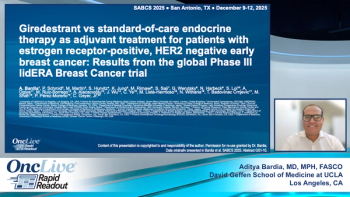
Opinion|Videos|December 20, 2023
Extended Follow-up of ALPINE Randomized Phase 3 Study Confirms Sustained Superior Progression-free Survival of Zanubrutinib Versus Ibrutinib for Treatment of Relapsed/Refractory Chronic Lymphocytic Leukemia and Small Lymphocytic Lymphoma (R/R CLL/SLL)
Author(s)Jennifer R. Brown, MD, PhD

Jennifer R. Brown, MD, PhD, presents data from the extended follow-up of the ALPINE study investigating zanubrutinib in relapsed/refractory chronic lymphocytic leukemia and small lymphocytic lymphoma.
Advertisement
Background
- ALPINE, a randomized, multinational phase 3 study (NCT03734016) in patients with R/R CLL/SLL, established the statistical and clinically meaningful superiority of zanubrutinib over ibrutinib on progression-free survival (PFS) and overall response rate (ORR) and confirmed the favorable safety/tolerability profile of zanubrutinib (Brown et al. NEJM; 2022).
- Now, with 3 years of overall study follow-up, we report the results of an extended follow-up analysis.
Methods
- As previously published, patients with R/R CLL/SLL who had received ≥1 prior therapy and had measurable disease were randomized 1:1 to receive zanubrutinib or ibrutinib. Efficacy assessments, including PFS and ORR, were evaluated by the investigator based on 2008 iwCLL criteria; sensitivity analyses to confirm PFS results were also conducted. Updated safety analyses were performed. All reported P-values are descriptive.
Results
- Overall, 652 patients were randomized to receive zanubrutinib (n=327) or ibrutinib (n=325).
- As of 15 May 2023, 63.3% (n=207/327) of patients remain on zanubrutinib and 52.3% (n=170/325) remain on ibrutinib.
- At a median study follow-up of 36.3 months, benefit of zanubrutinib over ibrutinib was sustained (HR: 0.67 [95% CI, 0.52-0.86]; 2-sided P=.002; Fig 1).
- At 36 months, the PFS rates were 65.8% with zanubrutinib and 54.3% with ibrutinib. Benefits in PFS with zanubrutinib were also observed across major subgroups, including in patients with del(17p)/ TP53 mutations (HR: 0.52 [95% CI, 0.32-0.83] 2-sided P=.005) where 36-month PFS rates were 60.1% and 43.6%, respectively. Additionally, the zanubrutinib PFS benefit was confirmed in a sensitivity analysis that included only progression and death events that occurred on active treatment (HR: 0.69 [95% CI, 0.49-0.97]; 2-sided P=.031).
- ORR remained higher with zanubrutinib compared with ibrutinib (85.0% vs 74.8%; 2-sided P=.001). Responses deepened in both arms with CR/CRi rates of 10.1% (zanubrutinib) and 7.4% (ibrutinib); therate of PR-L or better was 90.2% vs 82.8%, respectively. Fifty-nine (18.0%) patients treated with zanubrutinib and 71 (21.8%) treated with ibrutinib had died (OS HR: 0.76 [95% CI, 0.54-1.08]); 36-month OS rates were 82.6% (zanubrutinib) and 79.7% (ibrutinib).
- In this extended follow-up, median treatment duration was 34.7 months (zanubrutinib) and 31.5 months (ibrutinib). Across both arms, the most common reasons for treatment discontinuation were AEs (20.2%, zanubrutinib; 24.9%, ibrutinib) and progressive disease (12.2%, zanubrutinib; 16.3%, ibrutinib). Dose interruption and dose reduction due to AEs were 59.6% vs 61.1% and 14.2% vs 17.6% with zanubrutinib vs ibrutinib, respectively.
- The most common AEs of any grade with zanubrutinib and ibrutinib were COVID-19 (37.3% vs 25.6%), diarrhea (17.9% vs 25.6%), and upper respiratory tract infection (25.9% vs 17.3%). Rates of any grade ≥3 AEs and serious AEs were 72.2% vs 75.6% and 49.7% vs 57.4% with zanubrutinib vs ibrutinib, respectively.
- Most commonly reported grade ≥3 AEs were neutropenia (17.3% vs 16.4%) and hypertension (15.1% vs 12.0%). Rates of serious infections were 30.6% in each treatment arm. Discontinuation rates due to cardiac disorders were lower with zanubrutinib (0.6% [n=2]) vs ibrutinib (4.6% [n=15]).
- Overall cardiac events remain lower with zanubrutinib, including atrial fibrillation/flutter (6.2% vs 16.0%; 2-sided P<.0001). Across this study, no grade 5 AEs due to cardiac disorders were observed with zanubrutinib but were reported in 6 patients (1.9%) with ibrutinib.
Conclusions
- ALPINE was the first study to demonstrate PFS superiority in a head-to-head comparison of BTK inhibitors. At a median follow-up of 3 years, the study showed sustained PFS benefits of zanubrutinib over ibrutinib. The durable PFS benefits with zanubrutinib were observed across major subgroups, including multiple sensitivity analyses.
- The overall safety/tolerability profiles were consistent with previous reports for both treatments.
- The cardiac safety profile remained favorable for zanubrutinib compared with ibrutinib, with no new safety signals emerging with longer follow-up.
- With over 3 years of treatment, zanubrutinib continues to be a more efficacious and better tolerated treatment than ibrutinib for patients with R/R CLL/SLL.
Brown JR, Eichhorst B, Lamanna N et al. Extended Follow-up of ALPINE Randomized Phase 3 Study Confirms Sustained Superior Progression-free Survival of Zanubrutinib Versus Ibrutinib for Treatment of Relapsed/Refractory Chronic Lymphocytic Leukemia and Small Lymphocytic Lymphoma (R/R CLL/SLL). Presented at: 65th ASH Annual Meeting and Exposition, December 9-12, 2023. San Diego, California.
Advertisement
Latest CME
Advertisement
Advertisement
Trending on OncLive
1
Single-Center, Retrospective Data Show Low Rate of Lifileucel Infusion Following Referral in Advanced Melanoma
2
Real-World Data Support Clinical Benefit With Lifileucel in Previously Treated Advanced Melanoma
3
Outcomes With Bridging Therapy Correlate With Cilta-Cel Efficacy, Safety in Multiple Myeloma
4
Long-Term Cilta-Cel Data Show Low Rates of PFS Events in Standard-Risk R/R Myeloma
5






































